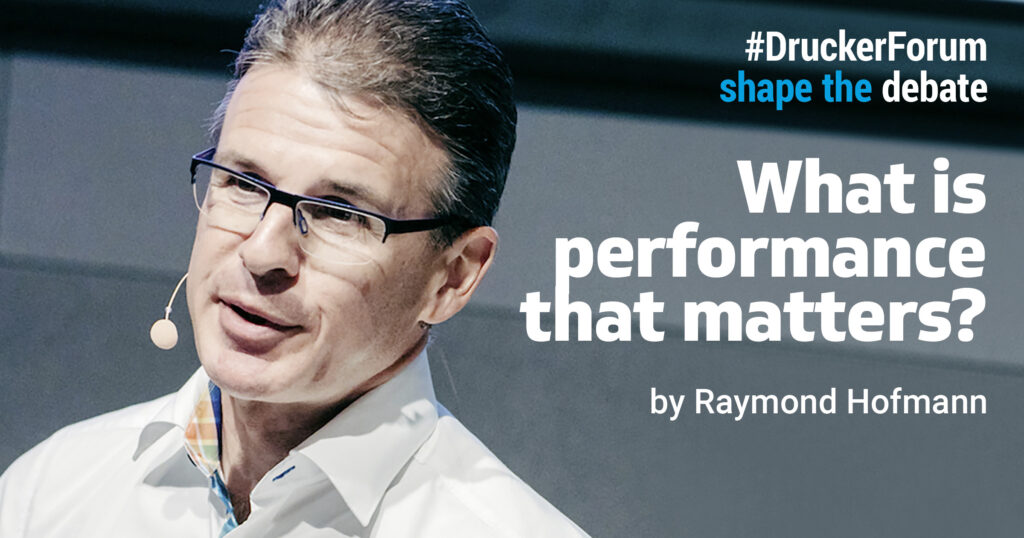
It was a cold November morning in 2016. As we walked from our hotel to the conference venue, I asked the late Clayton Christensen why he kept coming back to the Drucker Forum. He said, “At other conferences, I speak, and here, I learn.”
Clay’s response is as simple as it is profound. It perhaps summarises best why many consider the Drucker Forum the world’s premier management conference. It offers unrivaled depth and breadth of perspectives. It creates countless opportunities for thoughtful exchange between speakers and delegates, practitioners and academics alike. And in so doing, it does justice to Drucker’s name and legacy.
What is there to redefine?
Yet something struck me as odd as I read through this year’s conference abstract and learned that in 2022 we would aim to “redefine performance that matters.” What is there to redefine, I wondered? Drucker taught us that
- the ultimate test for management is performance
- the only meaningful definition of performance is results
- results are only found outside the organization
- and for a business, this means a satisfied customer
Drucker was also careful to remind managers of their social responsibilities. Is any of that no longer true? Is something missing?
Old questions and known answers
My confusion only grew when reviewing the more specific questions listed in the abstract. Each question fits one of five categories:
- How can large organizations be more entrepreneurial?
- How can businesses create value not just for shareholders but also for society?
- How can we leverage technology to improve the human condition rather than hurt it?
- How does an organization preserve its moral integrity as it aims to grow and improve performance?
- How can organizations cope with complexity and the speed of change around them?
These questions are not new, and we’ve been pondering these very same questions ever since the Forum’s first edition in 2009. What’s more, hasn’t Drucker himself already answered almost all of them?
Yes, times are changing. It’s good to revisit such vital questions from time to time. Yet I would argue that not much has changed at the most fundamental level, at the level of principles and foundational truths. We know the answers to these questions. So why do we keep asking them?
We don’t use our knowledge
This year’s abstract rightly points out that “management as a discipline has had many decades to study, test and spread what works in organizations and what doesn’t.” It then asks the inevitable question, “have our organizations become much higher-performing?”
Unfortunately, they haven’t. The evidence speaks loud and clear. The picture is the same whether we look at metrics such as employee engagement, innovation performance, the success rate of corporate transformations, or financial performance. On average, they remain dismally low (such as employee engagement at 15%, according to Gallup) or have even been in free fall (steady decline of RoA since 1965, according to Deloitte’s Shift Index).
And herein lies the reason why we keep asking these same questions. Because, in practical reality, they are still unresolved problems. We’re violating one of Drucker’s most important principles, that management is a practice and that knowledge is useless if we don’t use it to create results. We know the answers, but we don’t use them in practice.
The character of leaders
So why don’t we? Again, I believe Drucker has already given us the answer. He writes in Management: Tasks, Responsibilities, Practices (1973):
“Leadership is exercised through character. And character is not something leaders can acquire. If the leader lacks character – no matter how knowledgeable, how brilliant, how successful – he destroys. He destroys people, the most valuable resource of the enterprise. He destroys spirit. And he destroys performance.”
Here, I believe, is the elephant in the room. How many organizations make character a non-negotiable qualification for leadership? How many look for high standards of moral integrity in their people decisions? Are their leaders committed to speaking the truth? What is their motivation to pursue a career in management? Do they aim to serve customers, their people, institutions, and society?
Looking at the evidence, I can only conclude that they don’t. The so-called leaders are in it for themselves. And we let them get away with it. Yet an institution is never to be seen as a platform for anyone’s career, status, or enrichment. Sadly, in his fascinating book A Time to Build (2020), Yuval Levin demonstrates how that’s precisely what’s going on not just in business but also in politics, education, and journalism. He writes, “the people who occupy our institutions increasingly understand those institutions not as molds that ought to shape their behavior and character but as platforms that allow them greater individual exposure and enable them to hone their personal brands.”
The truth about human nature and the performance that truly matters
If we’re going to do anything about it, we need to come to terms with human nature. Would you be surprised to learn that Drucker also had something to say about that? In The New Realities (1989), he writes, “Management is deeply involved in spiritual concerns, the nature of man, good and evil.” And in a lecture titled Peter Drucker’s Theology of Work, Joe Maciariello quotes Drucker saying, “I’m only too aware that human beings perversely insist on behaving like human beings. This means pettiness and greed, vanity and lust for power and, yes, evil.”
Here is the second elephant in the room. Humans aren’t basically good. This profound insight penetrates much of Drucker’s work, and it’s why he puts such a heavy emphasis on character in leadership. We can’t just assume that humans will do the right thing, even if they know how to do it.
In that light, there may actually be a need to redefine “performance that matters.” What truly matters is our performance in shaping men and women of character. And in making sure that such men and women run our institutions.
Asking the difficult questions
Many will disagree with my analysis, and I invite you to change my mind. Do you have evidence that our organizations have become much better? Or do you have a better explanation for why they haven’t?
I’m well aware these are controversial questions. But we need to ask them if we desire to make real progress. Questions, especially the difficult ones, are the source of all learning. Remember why Clay Christensen came back to Vienna time and again? And questions, perhaps more than anything else, were the defining mark of Drucker’s work.
So let’s wrestle with such questions at this year’s Forum. To quote Charles Handy from his powerful closing address in 2017: “If not us, then who? And if not now, then when?”
About the author:
Raymond Hofmann is a management and organisation designer, entrepreneur and pastor-in-training. He is based in Switzerland.


Completely agree. Humans being human is the cause for what I call organizational entropy. Someone commented on a review I made of a book on highly effective teams, “Why another book on teams”? I responded with “Because management still doesn’t get it”
Thank you so much. Your post is very excellent and useful so I really appreciate that. Please keep it up!
I couldn’t agree more. The fact that people are people is what I refer to as the cause of organizational entropy.
Redefining what truly matters in performance challenges traditional views and invites deeper reflection. In my early career, I faced a similar issue when a company valued output over ethical leadership, leading to poor long-term results. Like the Forum advocates, I learned that building character within teams is essential. This lesson echoed strongly in reshaping how success is measured.
This is a powerful reflection! I agree that Drucker’s emphasis on character is often overlooked. It’s easy to chase metrics and rehash old questions without addressing the fundamental issue: the moral compass of leadership. Are we truly developing leaders with integrity? It’s a tough question to confront.